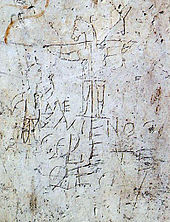Definition of blaspheme; speak irreverently about God or sacred things: such as he has blasphemed against the Holy Spirit.
Blasphemy is the act of insulting or showing contempt or lack of reverence for a religious deity or the irreverence towards religious or holy persons or things. Some countries have laws to punish blasphemy, while others have laws to give recourse to those who are offended by blasphemy. Those laws may discourage blasphemy as a matter of blasphemous libel, vilification of religion, religious insult, or hate speech.
Etymology
The word “blasphemy” came via Middle English blasfemen and Old French blasfemer and Late Latin blasphemare from Greekβλασφημέω, from βλάπτω = “I injure” and φήμη = “reputation”. From blasphemare also came Old French blasmer, from which English “blame” came. Blasphemy: ‘from Gk. blasphemia “a speaking ill, impious speech, slander,” from blasphemein “to speak evil of.”‘ ”In the sense of speaking evil of God this word is found in Ps. 74:18; Isa. 52:5; Rom. 2:24; Rev. 13:1, 6; 16:9, 11, 21. It denotes also any kind of calumny, or evil-speaking, or abuse (1 Kings 21:10; Acts 13:45; 18:6, etc.).”
Blasphemy laws
In some countries with a state religion blasphemy is outlawed under the criminal code. Such laws can be used to victimize non-members of, and dissident members of, the state religion.
Christianity

The satirical Alexamenos graffito is believed to be the earliest known representation of Jesus.
Christian theology condemns blasphemy. It is spoken of in Mark 3:29, where blaspheming the Holy Spirit is spoken of as unforgivable—the eternal sin. However, there is dispute over what form this blasphemy may take and whether it qualifies as blasphemy in the conventional sense; and over the meaning of “unforgivable”. In 2 Kings 18, the Rabshakeh gave the word from the king of Assyria, dissuading trust in the Lord, asserting that God is no more able to deliver than all the gods of the land. In Matthew 9:2, Jesus spoke the words “Your sins are forgiven you”; He was accused of blasphemy, since only God can forgive sins, although Christians believe that Jesus is God and hence entitled to do so.Blasphemy has been condemned as a serious, or even the most serious, sin by the major creeds and Church theologians.
- Thomas Aquinas says that “it is clear that blasphemy, which is a sin committed directly against God, is more grave than murder, which is a sin against one’s neighbor. … it is called the most grievous sin, for as much as it makes every sin more grievous.”
- The Book of Concord calls blasphemy “the greatest sin that can be outwardly committed”.
- The Baptist Confession of Faith says: “Therefore, to swear vainly or rashly by the glorious and awesome name of God…is sinful, and to be regarded with disgust and detestation. …For by rash, false, and vain oaths, the Lord is provoked and because of them this land mourns.”
- The Heidelberg Catechism answers question 100 about blasphemy by stating that “no sin is greater or provokes God’s wrath more than the blaspheming of His Name”.
- The Westminster Larger Catechism explains that “The sins forbidden in the third commandment are, the abuse of it in an ignorant, vain, irreverent, profane…mentioning…by blasphemy…to profane jests, …vain janglings, …to charms or sinful lusts and practices.”
- Calvin found it intolerable “when a person is accused of blasphemy, to lay the blame on the ebullition of passion, as if God were to endure the penalty whenever we are provoked.”
Catholic prayers and reparations for blasphemy
In the Catholic Church, there are specific prayers and devotions as Acts of Reparation for blasphemy. For instance, The Golden Arrow Holy Face Devotion (Prayer) first introduced by Sister Marie of St Peter in 1844 is recited “in a spirit of reparation for blasphemy”. This devotion (started by Sister Marie and then promoted by the Venerable Leo Dupont) was approved by Pope Leo XIII in 1885. The Raccolta Catholic prayer book includes a number of such prayers. The Five First Saturdays devotions are done with the intention in the heart of making reparation to the Blessed Mother for blasphemies against her, her name and her holy initiatives.The Holy See has specific “Pontifical organizations” for the purpose of the reparation of blasphemy through Acts of Reparation to Jesus Christ, e.g. the Pontifical Congregation of the Benedictine Sisters of the Reparation of the Holy Face.
The penalties attached to blasphemy
In the Old Law the blasphemer was punished by death. So God appointed on the occasion of theblasphemy of Salumith’s son: “The man that curseth His God, shall bear his sin: And he thatblasphemeth the name of the Lord, dying let him die: all the multitude shall stone him, whether he be a native or a stranger. He that blasphemeth the name of the Lord, dying let him die” (Leviticus 24:15-16). Upon hearing blasphemy the Jews were wont in detestation of the crime to rend their clothes (2 Kings 18:37, 19:l; Matthew 26:65).
Among the Athenians blasphemy was actionable and according to Plutarch, Alcibiades was made to suffer the confiscation of his goods for ridiculing the rites of Ceres and Proserpine (Plutarch, Alcibiades). Among the ancient Romans blasphemy was punishable, though not by death. In the time of Justinian we find most severe enactments against this sin. In a constitution of A.D. 538 the people are called upon to abstain from blasphemy, which provokes God to anger. The prefect of the city is commanded to apprehend all such as shall persist in their offence after this admonition and put them to death, that so the city and the empire may not suffer because of their impiety (Auth. Col., Tit. vii, 7 November). Among the Visigoths, anyone blaspheming the name of Christ or expressing contempt of the Trinity had his head shorn, was subjected to a hundred stripes, and suffered perpetual imprisonment in chains. Among the Franks, according to a law enacted at the Diet of Aachen, A.D. 818, this sin was a capital offence. In the Gospels blasphemy is described as one of “the things that defile a man” (Matthew 15:20; Mark 7:21-23).
Medieval canon law punished the blasphemer most severely. By a decree of the thirteenth century one convicted of blasphemy was compelled to stand at the door of the church during the solemnities of the Mass for seven Sundays, and on the last of these days, divested of cloak and shoes, he was to appear with a rope about his neck. Obligations of fasting and alms-giving were likewise imposed under heaviest penalties (Decret., lib. V, tit. xxvi). The rigours of the ancient discipline were insisted upon by Pius V in his Constitution “Cum primum apostolatus” (p. 10). According to the law herein laid down, the layman found guilty of blasphemy was fined. The fine was increased upon his second offence, and upon his third he was sent into exile. If unable to pay the fine, he was upon the first conviction condemned to stand before the door of the church, his hands tied behind him. For the second offence he was flogged, and for the third his tongue was pierced, and he was sentenced to the galleys. The blasphemous cleric, if possessed of a benefice, lost upon his first offence a year’s income; upon his second he was deprived of his benefice and exiled. If enjoying no benefice, he was first subjected to a fine and bodily punishment; on repeating the offence he was imprisoned, and still persisting, he was degraded and condemned to the galleys.

Writer Salman Rushdie was accused of blasphemy and subject of a fatwā issued byAyatollah Ruhollah Khomeini, the Supreme Leader of Iran, in February 1989.
Death sentence
Christianity In Britain’s last blasphemy execution, 20-year-old Thomas Aikenhead was executed for the crime in 1697. He was prosecuted for denying the veracity of the Old Testament and the legitimacy of Christ’s miracles.
Islam
The Quran and the hadith do not mention blasphemy. According to Pakistani religious scholar, Javed Ahmed Ghamidi, nothing in Islam supports blasphemy law. Rather,Muslim jurists made the offense part of Sharia; the penalties for blasphemy can include fines, imprisonment, flogging, amputation, hanging, or beheading. Muslim clerics may call for the punishment of an alleged blasphemer by issuing a fatwa.
Judaism
In the third book of the Torah, Leviticus 24:16 states that he that blasphemes the name of the LORD ”shall surely be put to death”. See also List of capital crimes in the Torah. The Seven laws of Noah, which Judaism sees as applicable to all people, prohibit blasphemy.
The United Nations
In the early 21st century, blasphemy became an issue for the United Nations. The General Assembly passed several resolutions which called upon the world to take action against the “defamation of religions.”
Colloquial usage;
Blasphemy has been used to mean “irreverence” in a non-religious context. Sir Francis Bacon uses “blasphemy” in this way in Advancement of Learning, where he speaks of “blasphemy against teaching”.”Blasphemy” may be used as a substitute for “profanity” or “cursing” as it is used in this sentence: “With much hammering and blasphemy, the locomotive’s replacement spring was finally fitted.”In contemporary language, the notion of blasphemy is often used hyperbolically. This usage has garnered some interest among linguists recently, and the word ‘blasphemy’ is a common case used for illustrative purposes.

No comments:
Post a Comment